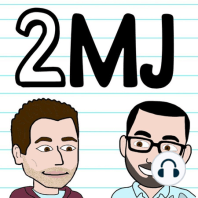26 min listen

The Shema's Impact on the Gospel and Replacement Theology
The Shema's Impact on the Gospel and Replacement Theology
ratings:
Length:
37 minutes
Released:
Jun 10, 2021
Format:
Podcast episode
Description
For centuries, scholars have argued that Paul thought the Church replaced Israel as God's chosen people and that Jewish identity is erased upon the acceptance of Jesus's Gospel message. Here, I argue that when you carefully read Paul's use of the Shema in Romans 3.27-31 and use the Tanakh, Josephus, and later rabbinic literature to expand your interpretative imagination, you find Paul understood God remained the God of Israel and that Jewish Jesus-followers were to maintain their Jewish identity.
00:00 - Introduction and Thesis Statement
3:10 - The Shema as a Pledge to the God of Israel in Deuteronomy 6.4
6:40 - The Shema abbreviated to 'God is One'
8:13 - The Shema in Zechariah 14.9
12:40 - The Shema in Josephus 16:12 - Josephus, Paul, and Gentile Conversion
20:31 - Paul's Use of the Shema in Romans 3.29-30
26:17 - The Shema in Rabbinic Tradition
30:24 - The Shema and the Gospel
_________________________________________
You can also listen on our YouTube Channel
Follow us on Social Media:
Facebook
Instagram
Support links:
SubscribeStar
PayPal
Merch shop
_________________________________________
Key Citations:
Josephus was about 19 and active in the Jewish world around when Paul wrote Romans (~55 CE). See The Life of Josephus 10-11. And, F. B. A. Asiedu, Paul and His Letters: Thinking with Josephus (Lanham: Lexington Books/Fortress Academic, 2020), xxv.
Paul and Josephus Claimed to be Pharisees. See The Life of Josephus 10–11; Phil. 3:4-5. And, Asiedu, Paul and His Letters, xxiii.
Paul and Josephus are writing to Gentiles. For example, Against Apion 1.1–3, 314; 2.1, 65–67, 147, 296; cf. Rom. 1:6, 13; 1 Cor. 12:2; Gal. 5:1-2.
Josephus's comments on Gentile conversion. For neutral to positive reactions, see Antiquities of the Jews 18.81–84; 20.17–96. For a negative reaction, see The Life of Josephus 111–112.
Noted works:
Mark Nanos, “Paul and the Jewish Tradition: The Ideology of the Shema.” In Celebrating Paul: Festchrift in Honor of Jerome Murphy-O’Connor, O.P., and Joseph A. Fitzmyer, S.J., edited by Peter Spitaler, 62–80. Washington, DC: The Catholic Biblical Association of America, 2011. Also found in Reading Paul Within Judaism by Mark Nanos.
Christopher R. Bruno, “God Is One”: The Function of “Eis Ho Theos” as a Ground for Gentile Inclusion in Paul’s Letters. (London: Bloomsbury Publishing, 2014).
_________________________________________
Music: https://www.bensound.com
00:00 - Introduction and Thesis Statement
3:10 - The Shema as a Pledge to the God of Israel in Deuteronomy 6.4
6:40 - The Shema abbreviated to 'God is One'
8:13 - The Shema in Zechariah 14.9
12:40 - The Shema in Josephus 16:12 - Josephus, Paul, and Gentile Conversion
20:31 - Paul's Use of the Shema in Romans 3.29-30
26:17 - The Shema in Rabbinic Tradition
30:24 - The Shema and the Gospel
_________________________________________
You can also listen on our YouTube Channel
Follow us on Social Media:
Support links:
SubscribeStar
PayPal
Merch shop
_________________________________________
Key Citations:
Josephus was about 19 and active in the Jewish world around when Paul wrote Romans (~55 CE). See The Life of Josephus 10-11. And, F. B. A. Asiedu, Paul and His Letters: Thinking with Josephus (Lanham: Lexington Books/Fortress Academic, 2020), xxv.
Paul and Josephus Claimed to be Pharisees. See The Life of Josephus 10–11; Phil. 3:4-5. And, Asiedu, Paul and His Letters, xxiii.
Paul and Josephus are writing to Gentiles. For example, Against Apion 1.1–3, 314; 2.1, 65–67, 147, 296; cf. Rom. 1:6, 13; 1 Cor. 12:2; Gal. 5:1-2.
Josephus's comments on Gentile conversion. For neutral to positive reactions, see Antiquities of the Jews 18.81–84; 20.17–96. For a negative reaction, see The Life of Josephus 111–112.
Noted works:
Mark Nanos, “Paul and the Jewish Tradition: The Ideology of the Shema.” In Celebrating Paul: Festchrift in Honor of Jerome Murphy-O’Connor, O.P., and Joseph A. Fitzmyer, S.J., edited by Peter Spitaler, 62–80. Washington, DC: The Catholic Biblical Association of America, 2011. Also found in Reading Paul Within Judaism by Mark Nanos.
Christopher R. Bruno, “God Is One”: The Function of “Eis Ho Theos” as a Ground for Gentile Inclusion in Paul’s Letters. (London: Bloomsbury Publishing, 2014).
_________________________________________
Music: https://www.bensound.com
Released:
Jun 10, 2021
Format:
Podcast episode
Titles in the series (41)
What Did Paul Say About Jesus? Responding to Rabbi Michael Skobac by Two Messianic Jews